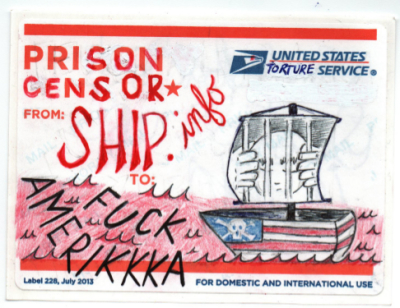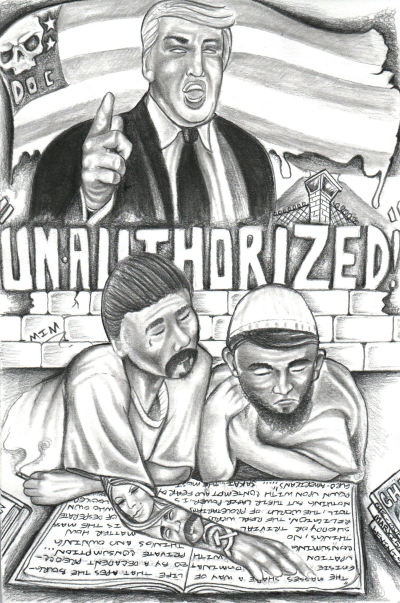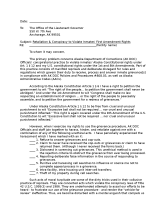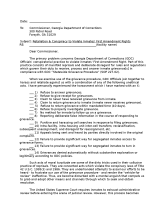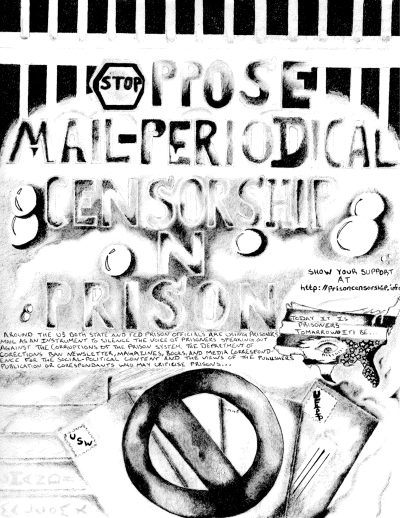Regarding the rejection of Under Lock & Key 45, I have yet
to see the publication. Yet allegations that it depicts “sexually
oriented content” make no sense to me. We may be able to use this false
review and classification as a means of obtaining relief against
arbitrary censorship. I am currently in confinement and was unable to
make a copy of the grievance and response for my safe keeping.
My current confinement is a serious retaliation against me resulting
from an incident on September 8, when a prisoner who was in handcuffs
was brutally assaulted by a Sergeant A. Arana. Shortly after the assault
I wrote a kite to a prisoner in confinement, informing him that a few
other prisoners had witnessed him being brutalized by Sergeant Arana. I
listed the names [of 3 other prisoners] in the kite, informing him that
he needed to write a grievance to the Inspector General ASAP, listing
those names as witnesses, that he gotta go all the way through with it,
that he could sue and that I was writing the secretary of the Florida
Department of Corrections Julie Jones asking her to look into his
brutality.
On September 12 all those names I mentioned in the kite and myself got
rounded up and placed in confinement under investigation. The Captain
showed me my kite even though it was not written using my government
name. I was being placed under investigation for “conspiracy to defraud
the state.” No such charge was delivered. Everybody else was released on
September 16, and I was released from confinement on September 18.
Once released I learned that Sergeant Gaucin, Sergeant Arana and
Sergeant Sanders were telling prisoners on the compound that I am an FBI
snitch. They are obviously trying to get me stabbed or killed. While
being escorted to confinement on September 12, Sergeant Gaucin searched
me and found an FBI/Department of Justice Civil Rights Division agent’s
business card. The agency has visited me twice due to my reporting on
brutality of prisoners. So I carry the card and give prisoners their
information if they need it. I wrote the Secretary a letter about being
called a snitch by officers. On October 2 I was placed in confinement
under protective management. On October 5 I was released.
The very next morning, October 6 at 8 a.m. count, Sergeant Juliano
approached my cell. The cell door was already open. Sergeant Juliano
ordered me out of the cell. I stood at the rail outside of the cell in
perfect view of the surveillance cameras. Sergeant Juliano opened my
locker and started dumping all my property on the floor, loudly stating:
“You snitch, you baby rapist, I don’t want no snitch in my dorm, you’re
getting out of my dorm right now, you wanna write up my officers? If you
don’t stop writing up my officers, I’m gonna fuck you up myself, you
damn snitch, you baby rapist,” making sure he was heard by the whole
wing. He continued, “I’m not Sergeant Arana you snitching mother fucker,
you’re going to jail.”
I was placed in handcuffs while he found my address books stating, “you
won’t be writing the Secretary and FBI and whoever else you like to
write about what’s going on here, you won’t be seeing these anymore,
snitch bitch,” putting my address books in his left cargo pants pockets.
I was escorted to the Captain’s office by Corrections Officer (C/O)
Hunter who stated, “you need to mind your own business, you write too
many grievances, you talk to much.”
At the Captain’s office I informed the Captain of everything that was
said and done by Sergeant Juliano and C/O Hunter. The Captain simply
informed me that I was being placed in confinement pending a
disciplinary review (DR) for disrespecting Sergeant Juliano; something I
never did.
On October 7 the DR was delivered. Sergeant Juliano stated that while
counting, he smelled smoke in the area of my cell and asked me if I was
smoking. He claimed I replied, “Bitch, ain’t nobody smoking, get the
fuck out of here and go do your job.”
On October 8 the DR hearing team informed me that I was being sentenced
to only 15 days rather than 30. They really wanted to let me go, but
they said that they feared for my safety and would decide what to do by
the time my 15 days would be up. I’m waiting to see how it works out.
No matter how it goes I’m filing a civil claim for retaliation. I had
just filed my tort claim in state court, been given a case number and
awaiting a response on my application for indigency. The tort is about
loss of my personal property last October.
We are putting the pressure on the pro-imperialist goons (pigs) down
here by simply letting the Secretary know what’s going on. The move is
picking up. However, they might skip me soon, that’s how it always go.
MIM(Prisons) adds: This report of both unfounded censorship (for
content that does not exist in Under Lock & Key!) and
punishment for reporting on conditions of confinement are ongoing
problems in Florida prisons. We’ve initiated a campaign against the
censorship in that state, but we know that it will likely come with
retaliation against those who choose to participate in the struggle. We
will use the pages of ULK to expose the Florida injustice
system, but we also need legal help to take on the broader
anti-censorship battle. It is of critical importance (and also legally
protected) that our comrades in Florida, facing this sort of abuse, be
able to receive political education and communicate their stories to the
outside world. Fighting the censorship is an important part of the
battle. If you are in Florida and want to get involved in the censorship
battle let us know.









